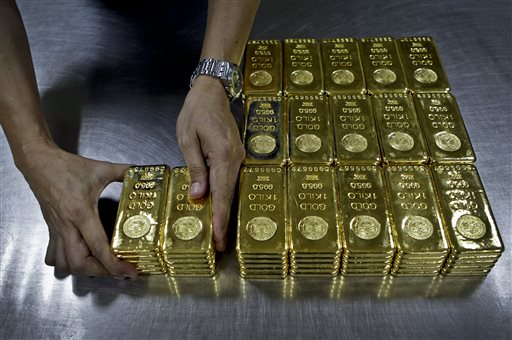Gold prices toppled like a ton of bricks on the heels of bad economic news from Cyprus and China, as the shiny metal hit lows not seen since 1983.
"It looks like it's going to head a little lower tomorrow [Tuesday] the way the aftermarket is treating it," said Don Smith, head of Chattanooga-based Southern Bullion.
The price of gold logged its biggest one-day decline in more than 30 years Monday, tumbling $140.30, or 9 percent, to $1,361.
Before the drop, gold had climbed every year since 2001, as investors bought the metal both as protection against inflation and as a so-called safe haven. The precious metal peaked as lawmakers wrangled over raising the debt ceiling in the summer of 2011 and threatened to push the U.S. into default.
But while some investors rushed to offload their precious metals this week, others say the sell-off is just a prelude to even greater heights than the record of $1,900 set in August 2011.
"In 2011 we took a dump like this, then when it started its way back up, it didn't slow until it the record high," said Rick Davis, owner of Rick Davis Gold & Diamonds.
Davis says that the cause of the sell-off isn't clear, but he expects prices to rise - eventually.
"I think for the most part, the big buyers have decided to take their money and profits, clean up their vault and their money for tax time, and once they get all that done, then they start buying back," Davis said.
Davis, Chattanooga's best-known buyer and seller of gold, says he's still buying in spite of the market panic. In fact, Friday and Saturday were his busiest days in weeks, he said.
"Even if it gets to $1,250, that's fine," Davis said. "I want to own a lot of it at $1,250."
A slowdown in inflation, combined with speculation the Federal Reserve is considering winding down its stimulus program, prompted investors to sell Friday. Reports that Cyprus may sell some of its gold reserves to pay off its debts, following its bailout, also rattled the market. The selling then intensified Monday as speculators dumped their holdings.
Here's why gold is falling and what the decline says about the economy:
INFLATION REMAINS LOW
Investors bought gold because they were afraid that inflation would rise too fast as a result of the Fed's stimulus. The higher cost of goods would erode the purchasing power of dollars. So far, though, inflation has remained under control, even as the economy has improved. In fact, the value of the currency has risen. That makes gold a less attractive investment.
THE FEAR FACTOR
Investors also buy gold as a safe haven, a kind of insurance when they are worried about the possibility of some kind of a financial collapse. While there has been a lot to worry about over the last six years -- the financial crisis, the threat of a U.S. default, meltdown in Europe -- none of those events have led to financial Armageddon.
That fear factor has dissipated after central bankers around the world have bailed out one economy after the other.
"Gold is an insurance asset for when things go very wrong," says Nicholas Brooks, head of research and investment strategy at etf securities. "It's just that people don't feel the need for insurance right now."
STOCKS ARE RISING
Stocks have surged this year on optimism that the U.S. economy is poised to decisively pull out of its slump following the Great Recession. That's pushed the Dow Jones industrial average and the Standard & Poor's 500 index to record levels.
The Dow is up 11 percent this year. Before the big sell-off, gold was down almost seven percent.
"In this world of hot money, 'what have you done for me lately,' people have lost patience. Especially when the Dow started making new highs, they started thinking, 'Why am I in gold? I'm missing all the action,"' says Peter Schiff, CEO of Euro Pacific Capital.
INTEREST RATES COULD RISE
The Fed has started contemplating ratcheting back its economic stimulus. If the economy continues to improve, the Fed may even raise interest rates to keep the economy from overheating, pushing up the cost of goods too much.
Holding gold makes sense when interest rates are close to zero, as they are now. That's because your money isn't earning anything in your bank account. If your money is earning a return on deposit, the attraction of gold fades.
AP Business Writers Bernard Condon and Christina Rexrode contributed to this report.

